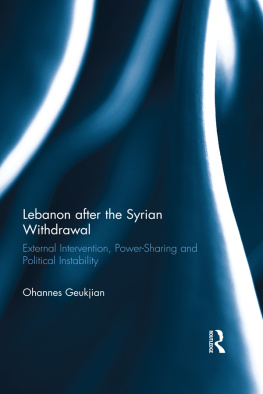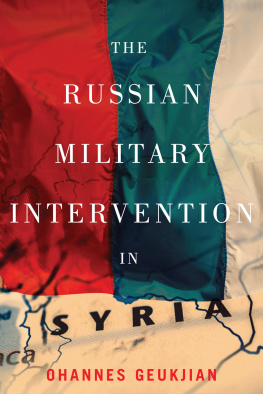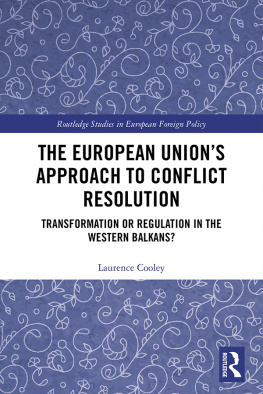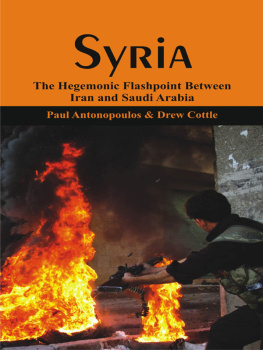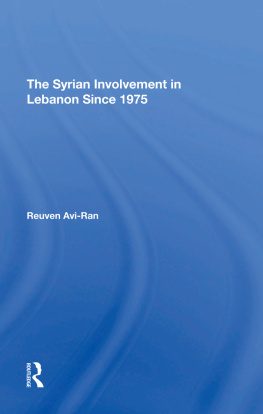Lebanon after the Syrian Withdrawal
Lebanon experienced serious instability and ethno-national conflict following the Syrian withdrawal in 2005, compounded by the Arab Spring, which led to regional instability and civil war in Iraq and Syria. Why did consociational democracy fail? Was failure inevitable? What impact could external powers play in creating an environment where consociationalism might be successfully implemented?
This book addresses these key questions and provides a comprehensive analysis of how internal and external elite relations influence the chances of a successful regulation of ethno-national conflict through power-sharing. Exploring the roles played by Syria, Qatar, Iran, Saudi Arabia, the United States and France, it argues that external actors in the Lebanese conflict largely determined whether power-sharing was successfully established and shows that the consociational democratic model cannot provide long-term conflict regulation in their absence. The author argues that relationships between internal and external actors determine the prospects for successful conflict regulation and pinpoints the crucial role of the external forces in the creation of power-sharing agreements in Lebanon, concluding that future success is dependent on the maintenance of positive, exogenous pressures.
This book will be of key interest to students and scholars studying politics, international relations, and Middle East studies.
Ohannes Geukjian is Assistant Professor in Comparative Politics and Conflict Resolution in the Political Science and Public Administration Department at the American University of Beirut, Lebanon.
First published 2017
by Routledge
2 Park Square, Milton Park, Abingdon, Oxon OX14 4RN
and by Routledge
711 Third Avenue, New York, NY 10017
Routledge is an imprint of the Taylor & Francis Group, an informa business
2017 Ohannes Geukjian
The right of Ohannes Geukjian to be identified as author of this work has been asserted by him in accordance with sections 77 and 78 of the Copyright, Designs and Patents Act 1988.
All rights reserved. No part of this book may be reprinted or reproduced or utilized in any form or by any electronic, mechanical, or other means, now known or hereafter invented, including photocopying and recording, or in any information storage or retrieval system, without permission in writing from the publishers.
Trademark notice: Product or corporate names may be trademarks or registered trademarks, and are used only for identification and explanation without intent to infringe.
British Library Cataloguing in Publication Data
A catalogue record for this book is available from the British Library
Library of Congress Cataloging in Publication Data
Names: Geukjian, Ohannes, author.
Title: Lebanon after the Syrian withdrawal: external intervention, power-sharing
and political instability / Ohannes Geukjian.
Description: Milton Park, Abingdon, Oxon: Routledge, 2017. | Includes
bibliographical references and index.
Identifiers: LCCN 2016022553 | ISBN 9781472482204 (hardback) |
ISBN 9781315591940 (ebook)
Subjects: LCSH: LebanonPolitics and government1990 | LebanonForeign
relationsSyria. | SyriaForeign relationsLebanon. | LebanonForeign
relations21st century.
Classification: LCC DS87.54.G48 2017 | DDC 956.9204/52dc23
LC record available at https://lccn.loc.gov/2016022553
ISBN: 9781472482204 (hbk)
ISBN: 9781315591940 (ebk)
Typeset in Times New Roman
by Keystroke, Neville Lodge, Tettenhall, Wolverhampton
To my Mother
Contents
| FM | Future Movement |
| FPM | Free Patriotic Movement |
| FSA | Free Syrian Army |
| ISF | Internal Security Forces |
| LAF | Lebanese Armed Forces |
| LF | Lebanese Forces |
| LNM | Lebanese National Movement |
| NDC | National Dialogue Committee |
| OCAL | Organization for Communist Action in Lebanon |
| PSP | Progressive Socialist Party |
| SSNP | Syrian Nationalist Party |
| STL | Special Tribunal for Lebanon |
| UN | United Nations |
| UNIFIL | United Nations Interim Force in Lebanon |
| UNIIIC | United Nations International Independent Investigation Commission |
1
Introduction
This book has its earliest origins in a research paper on the external intervention of regional and international actors in Lebanon and its impact on the Lebanese consociational system that I presented at the Middle East Studies Association (MESA) conference in Washington a few years ago. The panel was on Lebanon and external intervention in destabilizing the system after the assassination of former Prime Minister Rafik al-Hariri on 14 February 2005, the Cedar Revolution and the withdrawal of the Syrian forces from Lebanon in May 2005. Hariris assassination broke the post-civil war (19892005) stability that was initiated by the Taif Agreement in 1989 (discussed in ) and consolidated by Syrias dominant role with international support. The topic attracted a number of colleagues whom I met at the conference because the dramatic political and violent events that followed Hariris assassination are the least studied period in the scholarly books written on Lebanon. I learned a tremendous amount throughout this research not only from the topic of my study but also from the colleagues who graciously shared their ideas and expertise with me.
The title of this book Lebanon after the Syrian Withdrawal: External Intervention, Power-Sharing and Political Instability is descriptive and compatible with the beginning of a new period in Lebanons history. After May 2005, whilst Lebanon began to reclaim its independence and sovereignty after three decades of Syrian domination and manipulation of the power-sharing arrangements, immense endogenous (internal) and exogenous (external) challenges threatened the Lebanese power-sharing system that destabilized the country and increased sectarian tensions. Internally, the intransigence of the political elites and lack of consensus among them on a number of divisive national policy issues (Hizbullahs arms, national defense strategy, rule of law, the Special Tribunal for Lebanon, presidential elections, the cabinet and decision-making, foreign policy, the electoral system) created conflict and instability. All these issues are disputed between the Lebanese parties. Since independence in 1943, Lebanon has been governed by consent between the political elites, although the power-sharing arrangements that regulated conflict between the Christian and Muslim communities have broken several times, for example in 1958, 1975, 2005, 2006 and 2008. Externally, the unstable regional environment in the Middle East, the ArabIsraeli conflict, the Israeli security threat, and the divergent interests of Iran, Syria,
Still, the Arab Spring that started in 2011 in Tunisia (the Jasmine Revolution) and later spilled over to neighboring countries, mainly Egypt, Libya, Yemen, Bahrain and most recently Syria further destabilized Lebanon because each of the Lebanese parties has been committed more to the cause of an external actor. I argue that consociational failure and internal instability in Lebanon are linked to external intervention. In addition, Lebanese political elites on various occasions provoked and invited external intervention into their domestic affairs and relied on the help of external patrons to solve their internal problems. The post-2005 period under consideration demonstrates a significant difficulty in maintaining the consociational system in an unstable regional environment. The commitment of Hizbullah (which represents the majority of the Shia) to the Syrian and Iranian agenda and the Sunni communitys commitment to the Syrian opposition and Saudi Arabia made power-sharing and elite accommodation problematic. Both Hizbullah and some radical groups from the Sunni community have been involved in the Syrian conflict. Hence, the destabilization of the internal and external balance denied the Lebanese their traditional mechanisms for reconstituting the consociational arrangements. Writing this book in a transitional period in the Middle East illustrates the limitations and costs of imposing consociation in deeply divided societies such as Lebanon.

